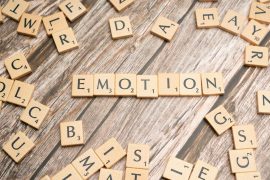
When most people think about intelligence, they picture IQ scores, logic, or problem-solving. But emotional intelligence-the ability to name, understand, and express your emotions effectively-can be just as important. Especially when it comes to your relationships, mental health, and personal growth.
And if you’re in therapy (or considering it), emotional intelligence is often the skill that turns insight into real change.
So, What Is Emotional Intelligence?
At its core, emotional intelligence is your capacity to notice what you’re feeling (without judging it), make sense of those emotions, and respond in a way that aligns with your values. It’s not about being emotional-it’s about being emotionally aware and intentional.
Here are a few core components:
- Self-awareness: Noticing what you’re feeling and why
- Emotional regulation: Managing strong emotions instead of being controlled by them
- Empathy: Recognizing emotions in others, not just reacting to them
- Healthy expression: Sharing emotions in ways that connect, not push people away
- Self-reflection: Learning from emotional experiences without getting stuck in them
Some people are naturally more in tune with their emotional world. Others-especially men raised to tough it out, perform, or never look “weak”-may have been taught to ignore or dismiss emotions altogether. That’s not a personal flaw. It’s social conditioning. And therapy can help undo it.
Why Emotional Intelligence Matters in Therapy
If you’ve ever felt like your emotions are too much-or like you shouldn’t be feeling what you’re feeling-you’re not alone. Many men I work with carry invisible pressure to keep it all together, stay rational, and not let anything “get to them.” I talk more about that dynamic-and how therapy can help-on the Men’s Mental Health page.”
But emotions don’t go away just because we ignore them. They often show up through irritability, distance, procrastination, burnout, or anxiety that feels hard to explain. Therapy creates space to start noticing what’s really going on underneath-and to make choices that aren’t just reactions.
That’s where emotional intelligence comes in.
Developing this skill in therapy means you can:
- Respond to stress without shutting down or blowing up
- Be more open and present in your relationships
- Understand your emotional patterns-and shift them
- Clarify what matters to you, so you’re not just reacting, but living intentionally
Therapy for Emotional Regulation and Growth
A lot of men worry that therapy will just be talking in circles or focusing too much on the past. But the work we do together is grounded, honest, and practical.
We start with building awareness-helping you put words to what’s happening internally, without judgment. Then we look at how those emotions show up in your everyday life: in how you communicate, avoid conflict, overwork, numb out, or get stuck in loops you don’t fully understand. From there, we begin to shift those patterns, step by step.
You’re not broken. You don’t need to be fixed. But you can develop a healthier, more honest relationship with your emotions-and that can change everything.
Start with Curiosity, Not Judgment
Emotional intelligence isn’t about becoming perfectly calm or emotionally “in control.” It’s about becoming more aware-and learning how to move through difficult moments without getting stuck in them or turning against yourself.
If you’re feeling overwhelmed, burned out, or disconnected from yourself or others, therapy can be a powerful place to start developing this kind of self-awareness.
It’s not about being more emotional-it’s about becoming more you.

